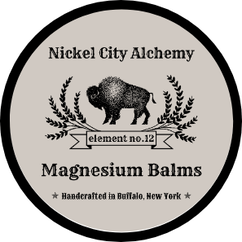- Home
-
All Products
- eGift Card
- Sleep Balm
- CBD Sleep Balm
- Recovery Balm
- CBD Recovery Balm
- Immunity Balm
- Little Buffalo Balm
- Simply Balm
- Heart & Soul Duo
- Magnesium Salt Soaks (1.85 oz)
- Magnesium Salt Soak (8 oz)
- Magnesium Salt Soak Bundle
- Self Care Candle Gift Set: Calming
- Self Care Candle Gift Set: Soul Warming
- Sleepy Buffalo Gift Set (2-Pack)
- The Gift of Wellness Set (3-Pack)
- The Gift of Wellness Set (2-Pack)
- Craft Your Own Gift Set (3-Pack)
- ADD ON: Extra Burlap Gift Bag
- Find in Store & Events
- Testimonials
- Contact
- Buffalo Beauts Partnership
- Blog
 Most of us know people who use pharmaceutical sleep aids like Ambien or more natural hormones like melatonin to deal with insomnia. We are a chronically sleep-deprived society, overworked, overstressed, and desperate for rest. Stressful jobs, raising children, trying to solve financial issues, and now living through a pandemic on top of it has made restorative sleep even harder to come by. For years, both of us have been familiar with the feeling of being unable to “turn our brains off,” as well as the migraines, brain fog, depression, anxiety, elevated cortisol (stress hormone) levels, and food cravings that can come from frequent sleepless nights. Losing sleep causes a cascade of other issues that affect all areas of our lives, and can even affect our cardiovascular health. But sleep aids do not get to the root of the problem, and they often linger in the body, causing grogginess the next day and even issues like short-term memory loss. So what is the root of the problem? Often, it’s magnesium deficiency. According to Transdermal Magnesium Therapy by Dr. Mark Sircus (2011), “Magnesium allows the muscles to relax, providing a calming effect that allows for deeper relaxation and better sleep” (p. 229). Functional medicine practitioner Dr. Mark Hyman even goes so far as to refer to magnesium as the “relaxation mineral.” According to Kerri-Ann Jennings in her article “How Magnesium Can Help You Sleep,” (2017) magnesium has even been shown to regulate the body’s natural melatonin cycle for sleeping and waking. It also “binds to gamma-aminobutyric acid (GABA) receptors. GABA is the neurotransmitter responsible for quieting down nerve activity. It is the same neurotransmitter used by sleep drugs like Ambien” (Jennings, 2017). In other words, magnesium may actually be able to do some of the work people have been turning to pharmaceuticals for! And in our conversations with people at events and markets, we find that most people who are already familiar with magnesium are taking oral supplements (magnesium citrate, for example) to help with sleep. And oral supplements can be very helpful. But transdermal magnesium chloride oil can get into our cells more quickly for a noticeable sense of relaxation. It is very helpful for people of any age, but transdermal magnesium can be particularly effective when it comes to sleep disturbances for people over 65, including people with dementia and Alzheimer’s. Dr. Sircus agrees that “In the elderly, magnesium supplements were found to improve sleep by decreasing the release of cortisol, a known cause of sleep disruption” (2011, p. 229-230). Also, the sleep disturbances that are so common for menopausal and post-menopausal women may be related to taking high levels of calcium without also supplementing with enough magnesium (Sircus, 2011, p. 229). And transdermal magnesium can even help with restless legs, hot flashes, and night sweats! To use our Sleep Balm, apply about ½ tsp on the sole of each foot, rub in, and put on a pair of socks for about 10-15 minutes (just to avoid getting the oils and butters on your sheets). The scent of the lavender essential oil adds an extra layer of relaxation. This can be done 20-30 minutes before bedtime. Then, read a book, meditate, have a cup of tea or reishi cacao and enjoy the sense of calm you feel.
0 Comments
Your comment will be posted after it is approved.
Leave a Reply. |
AuthorsNikki Bradshaw Archives
February 2022
Categories
All
|
- Home
-
All Products
- eGift Card
- Sleep Balm
- CBD Sleep Balm
- Recovery Balm
- CBD Recovery Balm
- Immunity Balm
- Little Buffalo Balm
- Simply Balm
- Heart & Soul Duo
- Magnesium Salt Soaks (1.85 oz)
- Magnesium Salt Soak (8 oz)
- Magnesium Salt Soak Bundle
- Self Care Candle Gift Set: Calming
- Self Care Candle Gift Set: Soul Warming
- Sleepy Buffalo Gift Set (2-Pack)
- The Gift of Wellness Set (3-Pack)
- The Gift of Wellness Set (2-Pack)
- Craft Your Own Gift Set (3-Pack)
- ADD ON: Extra Burlap Gift Bag
- Find in Store & Events
- Testimonials
- Contact
- Buffalo Beauts Partnership
- Blog

 RSS Feed
RSS Feed